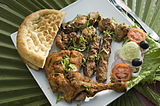Gajar ka halwa
 Gajar ka halwa | |
| Alternative names | Gajar ka Meetha Pak, gajrela, gajorer halwa gazoror halwa, carrot halwa, Gajar Pak |
|---|---|
| Course | Dessert |
| Region or state | Indian subcontinent |
| Associated cuisine | India, Bangladesh, Pakistan |
| Serving temperature | Hot or cold |
| Main ingredients | Carrots, milk, water, ghee, sugar, khoya |
| Variations | Black carrot halwa, red carrot halwa, carrot and beetroot halwa, cheesy carrot halwa |
Gajar ka halwa, also known as Gajorer halwa, Gajarno halwo, Gajrela, Gajar pak, and carrot pudding,[1][2][3][4] is a sweet Indian dessert made by placing grated carrots in a pot containing a specific amount of water, milk, sugar, and cardamom and then cooking while stirring regularly. It is often served with a garnish of almonds and pistachios.[5] The nuts and other items used are first sautéed in ghee, a type of clarified butter from the Indian subcontinent.[6] It is generally served hot during the winter.[7]
The dessert is traditionally eaten during all of the festivals in the Indian subcontinent, mainly on the occasion of Diwali,[8] Holi, Raksha Bandhan, and Eid.[9] It is served hot during the winter.[10]
Description
[edit]Gajar ka halwa is a combination of nuts, milk, sugar, khoya and ghee with grated carrots.[11][12] It is a light nutritious dessert with less fat (a minimum of 10.03% and an average of 12.19%) than many other typical sweets from the Indian subcontinent.[13] Gajar ka halwa has a medium shelf life so it is now sometimes exported.
At the time of festivals, many people prefer vegetarian dishes as well as desserts in their thali. Because of its low fat content, vegetarian characteristics, ease of making, medium shelf-life and taste, gajar ka halwa is a popular dessert all over India and often served at most festivals. The dish is popular among adults as well as children. In 300 grams of gajar halwa there are 268 calories (76 come from fat, 180 from carbohydrate and 16 from protein).[14]
Recipe and ingredients
[edit]Gajar ka halwa originally contained carrots, milk and ghee but nowadays includes many other ingredients like mava (khoya).[15]
The main ingredients of gajar ka halwa are freshly grated carrots, milk, sugar, cardamom, khoya, and ghee. Being a combination of milk and carrots, it is known as milk flavored gajar ka halwa but in the other case, the combination of cream or mava (khoya) and carrot is described as mava flavored gajar ka halwa.[16] For cooking gajar ka halwa, a cooker or kadai is usually preferred. Vasundhara Chauhan, writing for The Hindu, writes that gajar ka halwa should be slow-cooked and that using a pressure cooker spoils the dish.[17] The carrots must be grated before cooking.
Variations
[edit]Red velvet carrot halwa is a variation of the gajar ka halwa. It is made by heating a comparatively large amount of milk cream along with carrots, sugar, rose water and saffron over low flame.[18]
Other lesser-known variations include carrot and beetroot halwa, cheese gajar ka halwa, khajur gajar ka halwa and carrot dessert. Cheese gajar ka halwa is prepared with a combination of purple carrots and ricotta. This dish is popular in northern India because purple carrots are mostly grown there.[19]
See also
[edit]References
[edit]- ^ Chauhan, D. V. S. (1968). Vegetable Production in India. Ram Prasad.
- ^ Recipe: Carrot Halwa
- ^ Julie Sahni (1985). Classic Punjabi vegetarian and Grain Cooking. HarperCollins. p. 512. ISBN 0-688-04995-8.
- ^ "Gajar Ka Gajrela". NDTV Cooks. Retrieved 23 August 2012.
- ^ "Carrot Halwa Panna Cotta". Gulfnews. Archived from the original on 6 January 2014. Retrieved 23 August 2012.
- ^ Leverkuhn, A. "What is Carrot Halwa". Retrieved 23 August 2012.
- ^ "Recipe Khajur Gajar Halwa Carrot and Date Pudding with Coconut and Cardamom on Winter". Onegreenplanet.org. Retrieved 23 August 2012.
- ^ Palusci, Oriana (2010). English, But Not Quite: Locating Linguistic Diversity. Tangram Ediz. Scientifiche. ISBN 978-88-6458-007-4.
- ^ "- Nanakfoods "Gajar Halwa on Festivals"" (PDF). Archived from the original (PDF) on 30 October 2012. Retrieved 27 September 2012.
- ^ "Recipe Khajur Gajar Halwa Carrot and Date Pudding with Coconut and Cardamom on Winter". Onegreenplanet.org. Retrieved 23 August 2012.
- ^ Sharma, Vaishali. "Gajar ka Halwa (Sweet Carrot Pudding)". Archived from the original on 6 January 2014. Retrieved 29 August 2012.
- ^ Rosen, Diana. "Carrot Halwa". Archived from the original on 31 May 2013. Retrieved 29 August 2012.
- ^ Deepti Pathak. Chef (7 January 2018). "how to make perfect Gajar ka halwa". YouTube. Retrieved 6 December 2018.
- ^ "Nutrition Facts". Quitehealthy. Archived from the original on 1 February 2013.
- ^ Penny Isaacs; Sarah Lockett (14 February 2009). The Dish. Troubador Publishing Ltd. p. 139. ISBN 9781848761018. Retrieved 5 January 2014.
- ^ The Raman family (2012). "Carrot halwa Veg". bbc.co.uk. Retrieved 29 August 2012.
- ^ "Vasundhara Chauhan Article72932". The Hindu. Chennai, India. 2 January 2010. Retrieved 23 August 2012.
- ^ Gupta, Sonia. "Red velvet gajar halwa". Retrieved 28 September 2012.
- ^ Sahni, Chetna (28 March 2009). "A Mad Tea Party". Retrieved 28 September 2012.



